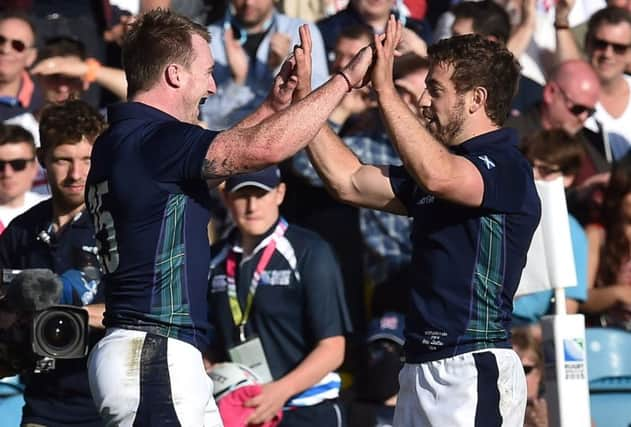Iain Morrison: Long way ahead but Scots can be proud


Australia and even New Zealand have both dropped points, with nine each. Of course it doesn’t mean much given the relative paucity of Scotland’s opposition to date but it is not as if the national rugby team have been so successful over the past decade that we can afford to let little milestones such as this one go unnoticed.
No team has really fired on all cylinders so far. The All Blacks stuttered for an hour against Argentina and then allowed Namibia the luxury of scoring a try against them – and against all expectation, Johan Deysel, since you ask. Australia have been commanding but they forgot to bag the bonus against Fiji. South Africa joined a less than imperious list of nations, including Thailand and Kazakhstan, who have never beaten Japan in an international match – that loss in the opening round was the first and only time the two teams have met. England have their backs to the wall after defeat by Wales (which is the only sensible place to stand given the English papers’ propensity to reach for their daggers).
Advertisement
Hide AdAdvertisement
Hide AdNot that Scotland coach Vern Cotter will be gloating, because he has issues of his own to keep him awake at night. Those ten points have come at a price. He must have originally imagined that he would be able to mix and match his squad over the first two matches before beefing things up for the challenge of South Africa and Samoa but he has already used up much of his ammunition.
Mark Bennett, Ryan Wilson, Finn Russell, Stuart Hogg and Ross Ford have all played most of two matches, which begs the question why the hooker wasn’t replaced earlier than the 78th minute of the Eagles game. Ford will be tired and, to a lesser extent, the same is true of his Edinburgh front-row colleagues WP Nel and Alasdair Dickinson, who had to come off the bench in Leeds (far earlier than Cotter would have wanted) to stabilise the set scrum and bring some much-needed impetus to the misfiring forward pack.
In the absence of Greig Laidlaw the two other kickers on the field, Finn Russell and Stuart Hogg, both missed first-half penalties, even if Hogg’s effort was out of Laidlaw’s reach. In the first half, the backs attempted to score a try with almost every play of the game, forcing passes and generally running around like their hair was on fire. The on-field skipper Henry Pyrgos might have identified the problem but he seemed powerless to do anything about it.
In the absence of openside flanker John Hardie, the only specialist seven in the squad, the Scots were roasted at the breakdown. They are to be handled with caution but the official figures have the turnover count at 8-1 in the Eagles’ favour and the USA’s Irish-born stand-off Alan MacGinty was rarely given an old-fashioned hurry-up.
Fraser Brown, a hooker by trade and training, was pressed into emergency service at flanker early in the second half and did a decent job, although the tide had already turned.
In the absence of Matt Scott, the Scottish midfield looked lightweight and occasionally porous. When the Eagles scored their first-half try they attacked the 10/12 channel and then the 12/13 channel and made ground every time. Midway through the first half, their outside centre Seamus Kelly was allowed to make a clean break from inside his own 22. Scotland have a highly competitive first XV, beneath that there is precious little depth, especially with two first-class centres, Alex Dunbar and Duncan Taylor, missing.
Saturday’s opponents have also had their own injury woes, losing their skipper Jean de Villiers to a broken jaw. That leaves a leadership hole but, from a playing perspective, it has strengthened the Springboks’ XV that Heyneke Meyer will put on the paddock.
De Villiers was getting a little long in the tooth and his likely replacement, Jesse Kriel, is very much the coming man – young, strong and athletic, a typical South African centre. He will likely form a powerful partnership with Damian De Allende, and Cotter may choose a defensive centre such as Sean Lamont or Richie Vernon to counter the threat. Especially so if Russell misses out and Duncan Weir starts. That scenario may suit the Scots better because it would allow Cotter to rest some players without undermining morale.
Advertisement
Hide AdAdvertisement
Hide AdIf Scotland are within touching distance of South Africa at the 60-minute mark, the coach could throw some tryscoring creativity on to the field in the hope that they can snatch a late win in the knowledge that his team have ended both their opening matches much the stronger side.
If the South Africans are already over the hill and half way home, then Cotter can keep some key players fresh for the Samoan challenge the following week.